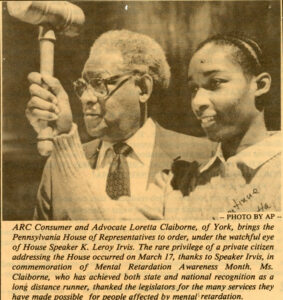“Don’t let anybody get you down. We are all given a gift, and it’s not how much you have but what you have and how you use it that is important. Get as much out of life as you can.” ~Loretta Claiborne
From our Archives we have found many articles from the mid 1980s documenting events and highlights about Loretta Claiborne. Claiborne is an athlete, speaker, and advocate who has left an imprint on many in Pennsylvania, the country, and beyond. Below is text from a speaker biography for Loretta Claiborne from a 1986 conference. [Note: The exact words and language of the biography from 37 years ago have been transcribed below.]
 ABOUT THE KEYNOTE SPEAKER
ABOUT THE KEYNOTE SPEAKER
Loretta L. Claiborne, Athlete & Public Speaker
“Mind your manners, because someday you might eat with the President,” Loretta Claiborne’s mother often admonished her seven children at mealtime, insisting on perfect table decorum.
It proved to be good advice. Years later, in 1983, Loretta Claiborne of York, Pennsylvania, was invited to lunch at the White House as a guest of President and Mrs. Ronald Reagan. The occasion was a fund-raiser hosted by the Reagans for the Special Olympic International Summer Games at Baton Rouge, Louisiana.
Meet Loretta Claiborne: fourth degree black belt karate expert: nationally known marathon runner; sought-after public speaker on dealing with disabilities (who composes her speeches in her head and uses no notes}; consistent blue-ribbon winner for her knitted clothing at the York Fair: pen pal of Eunice Kennedy Shriver; caring, articulate and involved.
Loretta Claiborne: classified shortly after birth as having mental retardation.
When Loretta was nine, her mother was pressured to put her into an institution – by the same person who later gave her a high school diploma. “My mother insisted that a child has a right to an education and refused to put me into an institution,” Loretta says, “and every night she helped us with our homework. If the school didn’t assign any, she would come up with something of her own for us to do.”
Taunted by the other children – “special eddy, retard” – Loretta learned early on to defend herself, and usually landed in trouble with school authorities for it. “Kids can be nasty to other kids,” she says, “and I was always in a fight, while the others in special education ran away from trouble. I finally walked up to the biggest bully in school and cracked him for calling me a retard.” That time the school principal backed her up
She excelled in physical education, and in senior high school was named “Girl of the Year in Physical Education.” At 13 she began running with her brother, who was a state cross-country running champion. At age 14, the sesamoid bones were removed from one foot, and she was told she would never run again. But in 1981 she was the first person with a handicap allowed to run in the Boston Marathon, covering its 26 miles in three hours and three minutes. She repeated that performance in 1982, and last year ran in the Kansas City Marathon. In 1981, she also was presented with the Spirit of Special Olympics Award at the home of Vice President George Bush – and was invited to Eunice Shriver’s home.
Loretta’s 15-year study of karate has made her one of the highest-ranking women in that sport on the east coast. She no longer competes because of the expense involved, but helps her instructor teach. “I won’t use it except in self-defense,” she says “and although I’ve been asked, I won’t demonstrate it in public because children might try to imitate me and hurt themselves.”
An eloquent speaker, she began making speeches for the Special Olympics and Association for Retarded Citizens, Pennsylvania, but now is in demand on her own – from groups as diverse as kindergarten pupils and graduate students in special education. The Special Olympics are a big part of Loretta’s life, and last year she spoke to a group of Special Olympians in Kansas. She also is active in Speaking for Ourselves, a Pennsylvania self-advocacy organization.
Loretta also worked with the Youth Corps for two summers, in a sheltered workshop for almost ten years, and for a local newspaper. But “to other people, I was always in the wrong when I fought back if I was harassed or discriminated against.” When she objected to doing five jobs for the salary of one, she was fired.
Loretta’s philosophy is “Don’t let anybody get you down. We are all given a gift, and it’s not how much you have but what you have and how you use it that is important. Get as much out of life as you can.”
Her advocate, Janet MacFarland of York, says, “Loretta uses her God-given talents well, and motivates young people to do their best. And God gave her to me.”
